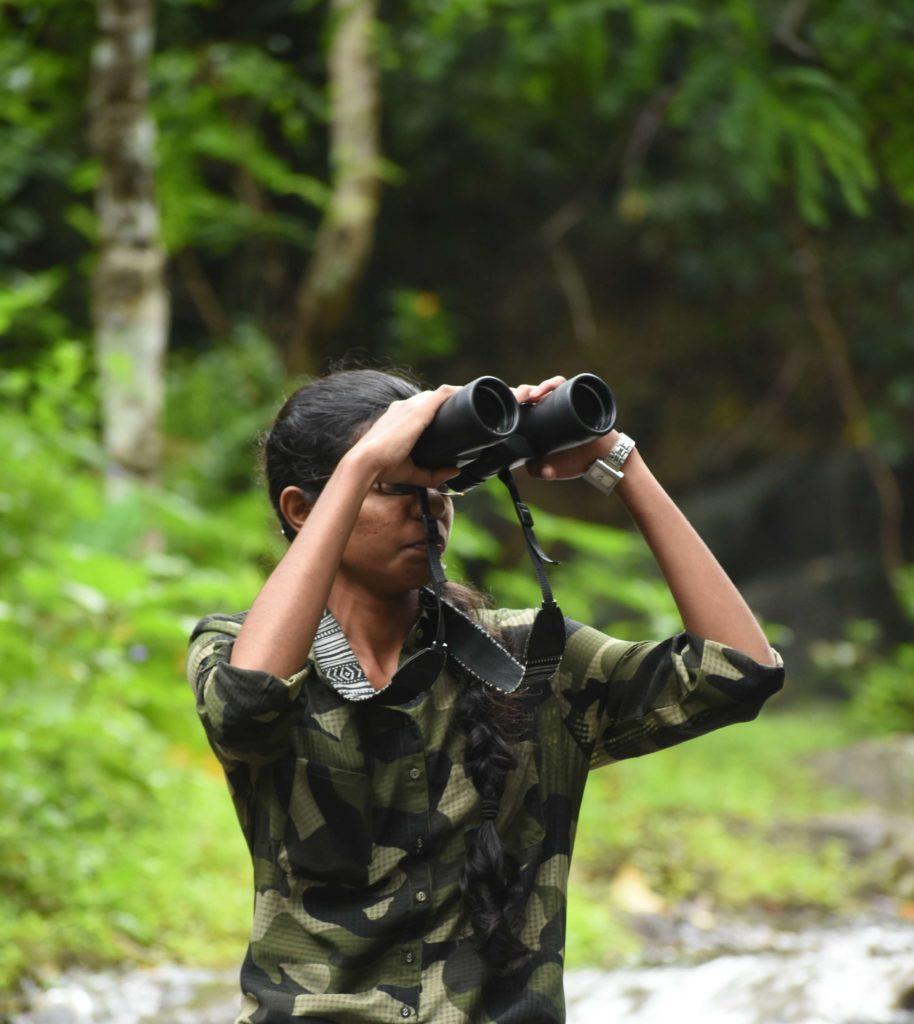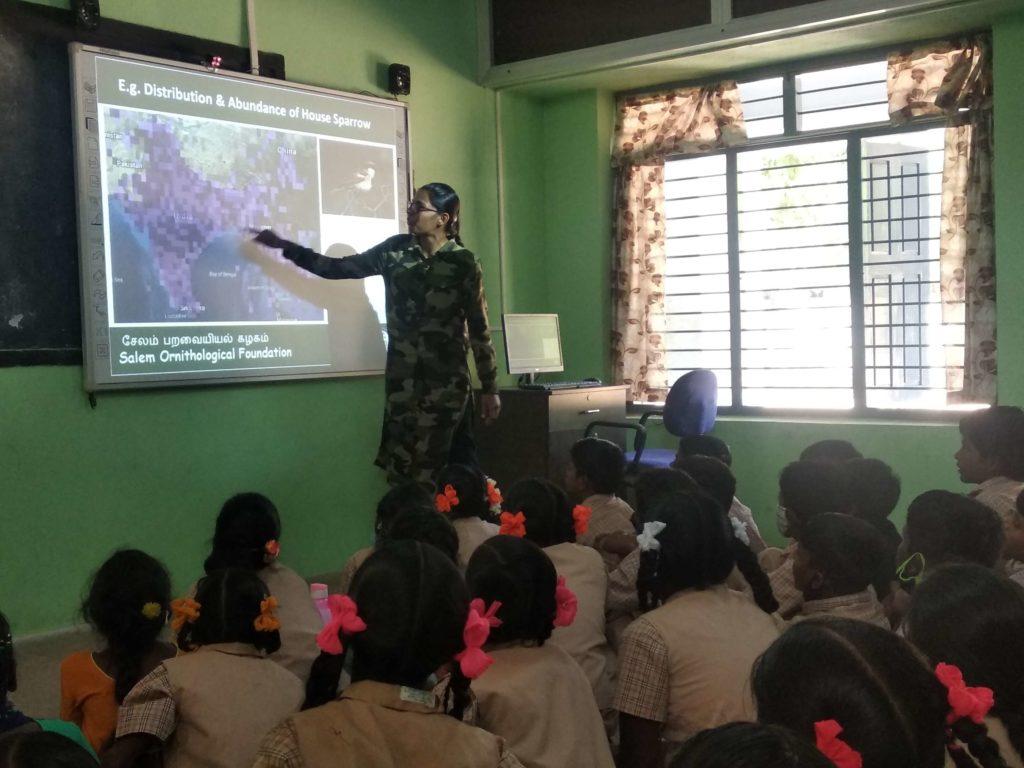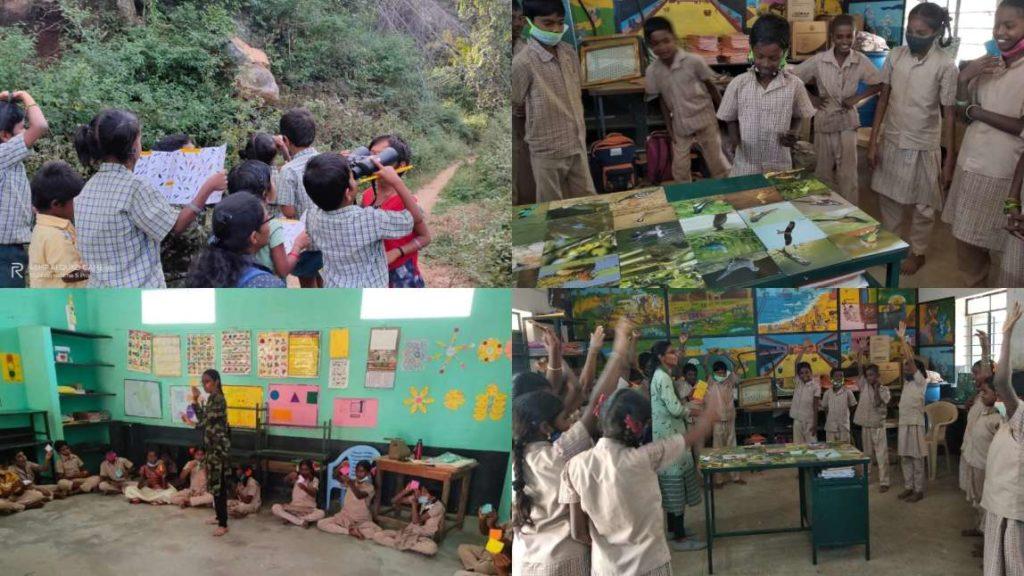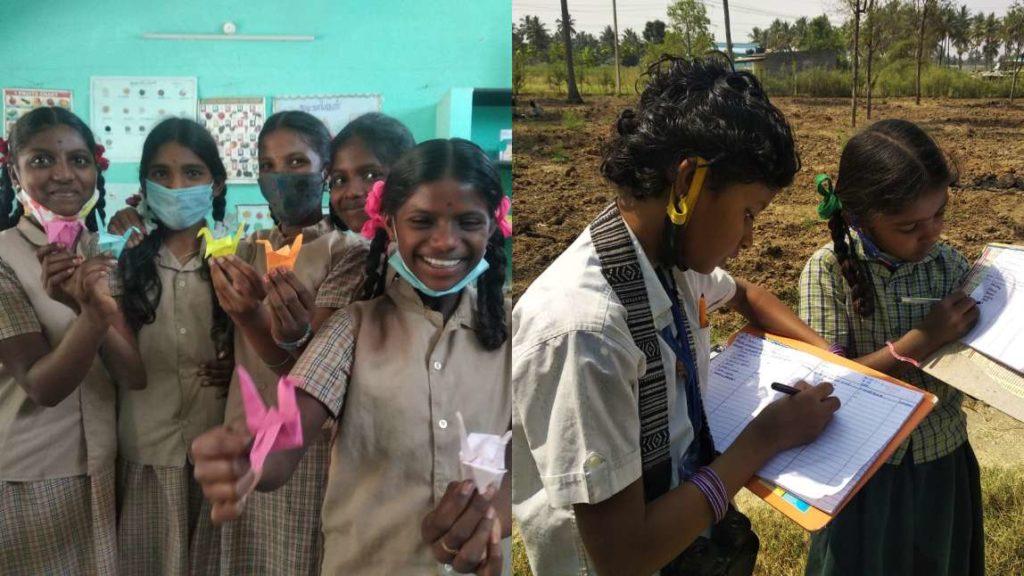Meet an Educator is a monthly series by Early Bird, where we feature the work of educators across India who are actively spreading the joy of birds and nature. This month’s featured educator is Angeline Mano M, a nature educator from Salem, Tamil Nadu. She introduces bird watching to women, children, youth and the public nature education programs.
Do tell us about yourself, where you are from, and your work
I’m Angeline Mano and I live in Salem. I am a postgraduate in English Literature. However, due to my strong affinity towards Nature Conservation and Education, I have switched from arts to science. I am currently pursuing my Bachelors of Science in Zoology. I focus on introducing birds & bird watching to women, children, youth and the public through bird walks, outreach & nature education programs, as education about nature and birds are the foundation for a better future. Since 2018, I have been extensively working with school students to improve the birding activity in Salem and I do it through different activity-based teaching methods. I also train youngsters to get interested in birding and natural history.
Currently, I work as a Nature Educator and Programme Coordinator at Salem Ornithological Foundation (SOF). I am also working on the OrniSchool Project to implement CEPA activities of Ramsar Convention in educational institutions of Salem.
Are you a birder? What about bird watching excites you?
Yes, indeed. I have been birding for 5 years and an active eBirder too!! Ever since I was a child, I have always had a great love for nature. It all began at my grandmother’s place, a village near Thamirabarani River (Porunai) where I used to watch the waterbirds with delight. I always feel empty when I don’t have my binoculars around my neck. So, I always have them with me, no matter where I go. Bird watching is an indescribable feeling. What I love about birds is how they behave, because just by observing them we can understand a lot of things in life. I cherish every moment, no matter how difficult the terrain is, no matter how the weather is. Each and every time, when I sight Black-winged Stilt (my all time favourite bird), those moments become more exciting than anything else!

When and how did you get interested in bird/nature education?
It was my mother who sowed the seeds of love for birds in me. My childhood fascination for the natural world increased multifold after I joined Salem Ornithological Foundation as a volunteer during my undergraduation. I started learning and educating people about the importance of nature conservation for our own future. The more I observed and learned, the more I wanted to work on finding ways to educate people and make them understand their responsibilities to protect and conserve the environment. It was during the year 2019, after I got to learn a lot about birds through citizen science events, something sparked in me. It was during that year, for the Great Backyard Bird Count, we went for birding at the Stanley Reservoir–Pannavadi, Salem which is a potential Ramsar Site. I was literally taken aback by the beauty of the water birds. The sight of the raptors diving to get its prey, all the dabbling ducks in large flocks were mesmerizing. When I saw those birds, I was filled with joy, I realized and decided to spread this joy to all around me. It all started when I met the team of young birders from PUMS, Krishnampudur who have been provided with bird education by other educators. Just then, I realized how blessed they are to get connected with nature and learn things from nature at their young age.
Back in my school days, I wasn’t given nature education in schools, but gratefully taught by my parents. In that moment, with determination, I decided that all the school children should learn and get nature education right from their school days. At the outset, my first outreach program at Panchayat Union Primary School, Jambuthumalai motivated me a lot to provide children with Bird Education. That’s how I got interested in bird/nature education. I didn’t want to keep it all to myself, rather I wanted to share this joy with everyone, especially to the younger generations.
What do you hope to achieve through your education work?
One of my long term goals with regard to nature education is to restore the lost connections with nature. By which the young minds can make wise decisions to document and conserve their biodiversity around them. I also hope to bring out and show children the importance of birds via nature education.

Why do you believe it is important for children to learn about birds or connect with nature?
Kids and children of this generation are addicted to electronic gadgets. Now-a-days, they also forget to look upon the components in nature. As a result of this, they have gradually lost their connection with nature. In order to restore the connection with nature and to develop their interest, it is essential to provide them with nature education. Not only to restore but also to enhance and encourage the children who possess a great connection with nature. It is always essential for the children to connect with the living world for their better future, as they are the hope of our future. Not only for a better future, but for a healthy mind which is indispensable.
What tools or resources have helped you in teaching about birds?
I use Flashcards and pictures of birds during indoor and outdoor sessions. This method of using pictures during the sessions helps children understand better, and quicker. For bird walks, I use Early Bird Pocket Guides. I engage children with games and activities for classroom sessions which involve artistic and creative approaches. I include:
– Origami
– Nature journaling
– Bird sketching
– Bird-based games
– Field activities & birdwatching
– Early Bird’s kit which includes posters, puzzles, connect the dots and more
– Powerpoint presentations

Have you encountered a significant challenge as a bird/nature educator, how did you overcome it?
There are several challenges as a nature educator. One such is leading larger groups of children, both for walks and also for indoor sessions. So, I make plans to split them into groups and engage each group with equal attention, so that no kid is missed out. Another significant challenge for me was shifting completely from English Literature (Arts) and taking up the role of bird/nature educator. In spite of having 3+ years of experience in bird/nature education, it was too hard for me to overcome the struggles from my previous academic side. It was also challenging for me to take up this role confidently, as none of my family members were into this field. Keeping all this aside, I started working on my part consistently and that’s how I am here now! Special thanks to my parents for their constant support.
Do share any memorable moment or experience you have had in teaching kids about birds/nature.
There are lots of memories that I have had with the kids. After an interactive presentation in a classroom session, the kids of Jamboothumalai Primary School were taken for a bird walk. My colleague, Ganeshwar SV, and I distributed pocket guides to the kids. The moment when all of them got their copies, one kid read the word ‘பறவைகள்’ meaning birds in Tamil, which was on the first page of the pocket guide. Within a few seconds, he started singing ♫ Wow பறவைகள் ♫ (‘Wow Birds’) and all the kids joined him singing the phrase. My joy knew no bounds, and this is what I work for – bringing up this true happiness in their hearts and minds.
Another memorable moment was at the Panchayat Union Middle School, Latchumayur. We were playing a memory game with Early Bird flashcards. It was their time for having lunch, but they never wanted to leave us. “It’s just for one day; we don’t mind having lunch at all. We want to play more; let’s play more, Akka. When will you come back again?” These were some of the loud, collective voices from students which were proof of their enjoyment and fun. I felt very much satisfied with the work I do.

Have you noticed any changes in your learners after they received exposure to birds and nature-based learning?
Nature-based learning performs many miracles in young minds, there are a lot of changes identified in children. The students who were once hunting birds and disturbing bird’s nests have now started to conserve them by putting up artificial nest boxes in their school campus and monitoring the birds that visit their school campus. The children also keep a regular note of bird checklists in the bird watching log books, further contributing to citizen science. Nature-based learning has also developed in them a deep sense of care for nature. Added to this, I have also got feedback from the school teachers that they are being punctual and attentive in class. All these changes and development in their class environment has been made possible only with nature-based learning.
What message would you have for your fellow educators, or somebody starting out in their nature education journey?
There is a need for Nature Education everywhere now. I would rather share a message of encouragement, not tips. Everyone has a unique way of teaching, try creating new activity-based teaching & learning methods and implement them in your own unique way. Let us continue to teach our part with all our hearts and we shall see the fruitful results coming up. When things take a lot of time, trust me that it doesn’t mean it will not happen. So never discourage yourself. “I suppose I’ve done my bit, it’s now up to you younger people” are the words by Dr. Salim Ali. Take this up as a motivation and let us all join hands to prepare the young people for their healthier bodies, minds, environment and a healthier future.


Hi Angeline,
I am Aparna living in Bangalore but my native is Salem. Got very excited to see your post here. Can I connect with you to discuss some CSR projects that we can possibly do in Salem and also for getting some birding experience when we come to salem.
Hi Aparna,
That’s wonderful and thanks for getting in touch! You can connect with Angeline at angelinemanom(at)gmail(dot)com